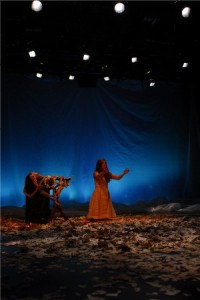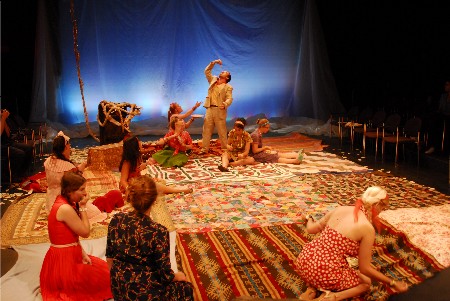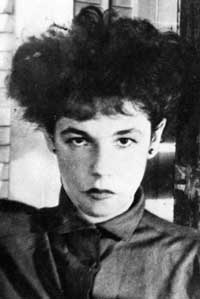Theater Commentary: A Rare Outing for an Undervalued American Drama
By Bill Marx
Can’t we get our unjustly neglected American playwrights right? A chance to see a marvelous, overlooked American play of the 1950s. And it is not by the prosaic William Inge.
“When something seems ‘the most obvious thing in the world’ it means any attempt to understand the world has been given up.” — Bertolt Brecht
Can’t we get our unjustly neglected American playwrights right? Only the theater’s weak-kneed appetite for “the most obvious thing in the world” during hard times explains the current vogue for the small-bore realism of the plays of William Inge, who back in the 1950s was spoken about in the same breath as Tennessee Williams and Arthur Miller. He drifted into relative obscurity in the early 1960s but now, after an edgy New York production of Come Back Little Sheba, he’s back. Times are tough, so it is not surprising that someone digs up a once “significant” Broadway hit-maker to dust off with an auteurist whisk. Inge’s angst-ridden, Middle American subject matter is now tame (no evangelicals around to make audiences uncomfortable, only the libido-challenged), though “well-observed.” The added bonus is that graying theatergoers may be familiar with Inge because of the movie versions of his scripts.
To be fair, the chorus for Inge has been building for a bit—back in 1990s critic Terry Teachout in Commentary made a case for Inge as a great American playwright—partly because the dramatist had the courage (in the 1950s) to suggest that the antagonist in Come Back Little Sheba is no longer sleeping with his wife, a revelation that is the fodder of sitcoms today. As for Inge’s Bus Stop (at the Huntington Theatre Company through October 17), Teachout calls the script, which was produced on Broadway in 1955, “a consummate romantic comedy” in his Commentary article. In his review of the Huntington Theatre Company (HTC) production he talks about its “emotional truth.” Anyone who has seen the Huntington Theatre production would be mighty puzzled by this description.
Director Nicholas Martin’s broad comic take on the script downplays the potential dark underside of this dramedy, which explores how we deal with the predatory nature of love. The sentimental mechanics of the cartoon cowboy who needs lessons about respectin’ his reluctant love object overwhelms the provocative counterpoint of desire provided by a tortured pedophile who is also on the hunt for underage sexual prey. Deciding that nothing should disturb the good-time, Americana vibes, the HTC production turns the play into a dated farce. But even if the script had been treated with more subtlety, Bus Stop is far more serio-comic mix-and-match than anything else.
Inge was chafing (a bit) at the edges of realism in Bus Stop, but he was too enamored by Broadway success to challenge tried-and-untrue showbiz formulas. But, also at Boston University, in a student production (at the Lane-Comley Studio 210 through October 21), there’s a rare revival of a genuinely neglected American play, a marvelous script that upturns conventional dramaturgy with wit, courage, and artistry. Staged in 1953 in an off-Broadway production that fizzled, Jane Bowles’s In the Summer House is far greater than anything Inge wrote for the theater, an “experimental” drama that purposely uses estrangement to examine the ambiguities of social and psychological constriction as well as the smothering attachments of parent and child. Anyone interested in the (alternative) artistic underside of American drama should take a look at this production.
In the Summer House takes up some of the same themes as Bus Stop— elemental loneliness, the need for change—but its tale of mother/daughter waging an alternately fantastical and repressed war of domination and submission depends on an impish surrealism that anticipates the work of Edward Albee (Think A Delicate Balance). The heavily underlined “feelings” and neat “messages” of Inge are replaced by an attempt to dramatize a ferocious will-to-control born of spiritual emptiness—the incongruity generates surprise and illumination. Over the years the play has had its champions, from Tennessee Williams to poets John Ashbery and Frank O’Hara. It continues to challenge audiences used to the same-old, so In the Summer House is seldom produced.
Jane Bowles’s fine play is part of The Boston University College of Fine Arts’ 14th Annual Fringe Festival celebrating the work of Paul and Jane Bowles, in honor of Paul Bowles’s 100th birthday. (Bowles is also a far greater writer than Inge.) The festival also includes a production of Yerma, an unpublished opera by Paul Bowles after the play by Lorca; Art Song Meets Theatre, a recital of Bowles songs staged as scenes; and the Bowles Centennial Celebration, which will feature chamber music performances and theatrical readings to conclude the festival on October 30.
As Frank Rich wrote in a NYT review of a 1993 New York revival of In the Summer House, the play is an “odd-duck drama about mothers and daughters.” But the script is more compelling, more magically unsettling, than the sleek, empty-headed commercial swans that float serenely by.
Bill Marx is the editor-in-chief of The Arts Fuse. For over four decades, he has written about arts and culture for print, broadcast, and online. He has regularly reviewed theater for National Public Radio Station WBUR and The Boston Globe. He created and edited WBUR Online Arts, a cultural webzine that in 2004 won an Online Journalism Award for Specialty Journalism. In 2007 he created The Arts Fuse, an online magazine dedicated to covering arts and culture in Boston and throughout New England.





Inge wrote one great play: “Dark at the Top of the Stairs” (1957).
I have read “Dark at the Top of the Stairs” but I have never seen it on stage, so I am curious.
I’d love to add to the list of under-produced American playwrights the unfailing, quietly brilliant Horton Foote, a man whose support of my writing changed my life and who created one completely absorbing scene after another.
I’m glad that our BU production of the Jane Bowles play received some attention! I’ve been haunted by the play since first encountering it in the late 70s. (It was recommended by a close friend whose taste and judgment seldom fails.) This current BU Fringe Festival exploration of both Jane and Paul Bowles made it the perfect fit—along with a group of eager collaborators coming from our student body! We are happy to share our production of this unique play with Boston audiences.